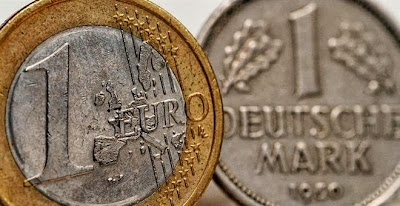Συχνά πολλοί αναρωτιόμαστε: Ποιούς οφέλησε η κρίση στην ευρωζώνη; ή τη Γερμανία ποιό νόμισμα τη συμφέρει, το μάρκο ή το ευρώ;
Μια σύντομη απάντηση σε αυτά τα ερωτήματα μπορεί να δοθεί από το παρακάτω σημείωμα του Paul Krugman στη γνωστή στήλη του στους New York times.
Germany As Currency Manipulator
Μια σύντομη απάντηση σε αυτά τα ερωτήματα μπορεί να δοθεί από το παρακάτω σημείωμα του Paul Krugman στη γνωστή στήλη του στους New York times.
Germany As Currency Manipulator
A
correspondent (update: And it was, in
fact, Ian Fletcher. I’m not endorsing his overall views, but this was a good
point) makes a good point. In talking about trade and secular stagnation, I
described Germany, with its huge surpluses, as not a currency manipulator. As
the correspondent said, however, the euro can be seen as a de facto foreign
exchange intervention to keep the de facto Deutsche mark weak. Before 2008, the
euro encouraged private capital outflows from Germany to the periphery. Since
then, both official rescue packages and also lending among national central banks
in the euro area can be seen as taking the place of these private flows.
The
interbank portion is shown in this chart from Pimco:
The general
point is that if we imagine a euro breakup, I think everyone would agree that
the new mark would soar in value, making German manufacturing much less
competitive. The German public imagines that it is being cruelly exploited for
the benefit of lazy southerners; arguably, what’s really happening is more like
China’s purchases of dollars, which are intended not to subsidize America but
to boost industry.


